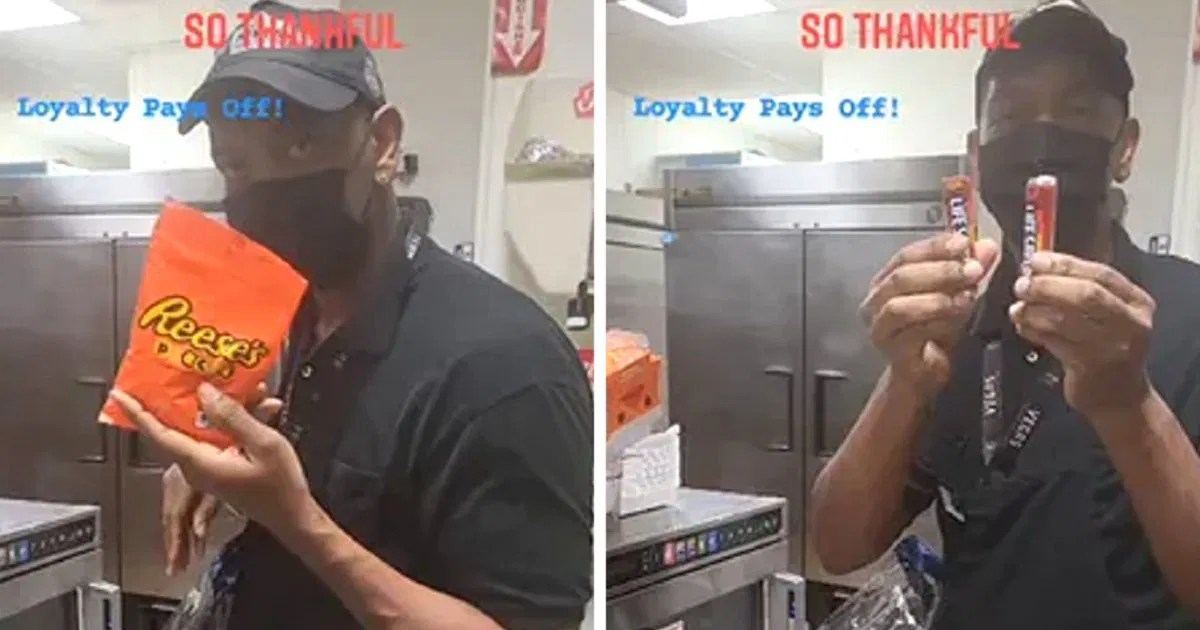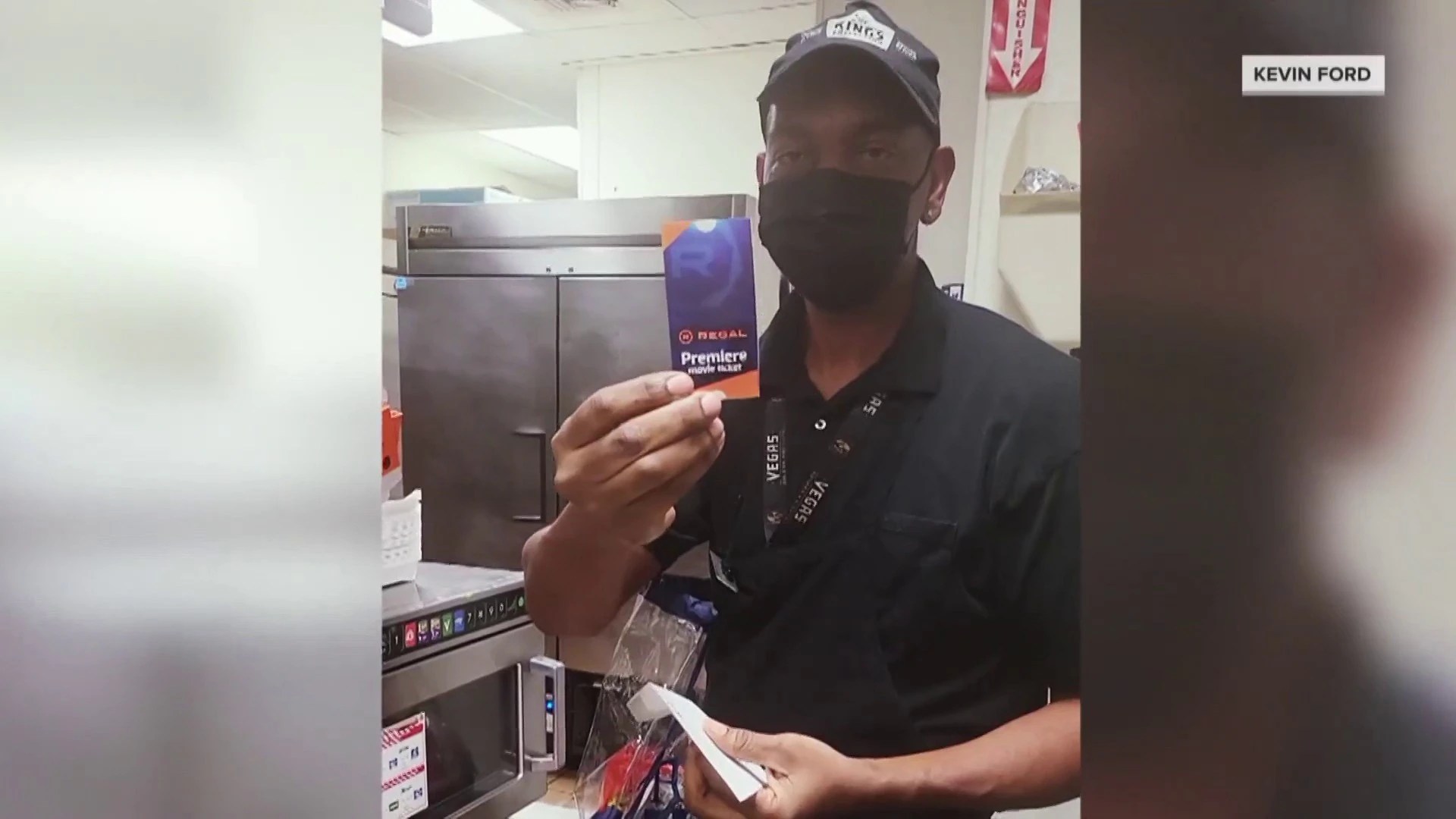What is the Kevin Ford Burger King Response?
The Kevin Ford Burger King Response refers to a series of tweets posted by Kevin Ford, a former Burger King employee, in response to a customer's complaint about the fast-food chain's service.
In his tweets, Ford criticized Burger King's management and accused the company of mistreating its employees. The tweets quickly went viral, sparking a wave of negative publicity for Burger King and ultimately leading to Ford's termination.
The Kevin Ford Burger King Response is significant because it highlights the growing power of social media to hold corporations accountable for their actions. It also sheds light on the challenges faced by low-wage workers in the fast-food industry.
Kevin Ford's Personal Details
| Name | Kevin Ford |
|---|---|
| Occupation | Former Burger King employee |
| Twitter handle | @kevinfordbk |
Main Article Topics
- The Kevin Ford Burger King Response
- The power of social media
- The challenges faced by low-wage workers
Kevin Ford Burger King Response Key Aspects
The Kevin Ford Burger King Response was a significant event that highlighted several key aspects, including:
- Social media power
- Employee mistreatment
- Fast-food industry challenges
- Customer service importance
- Corporate accountability
- Labor rights advocacy
- Viral marketing impact
These aspects are interconnected and underscore the complex relationship between businesses, consumers, and employees in the modern digital age. The Kevin Ford Burger King Response serves as a case study in the power of social media to amplify the voices of marginalized workers and hold corporations accountable for their actions.
1. Social media power
Social media has become a powerful tool for individuals and groups to share their voices and hold corporations accountable. The Kevin Ford Burger King Response is a prime example of the power of social media to amplify the voices of marginalized workers and bring about change.
Before social media, Ford's complaints about Burger King's management would likely have gone unnoticed. However, by sharing his story on Twitter, Ford was able to reach a wide audience and spark a national conversation about the challenges faced by low-wage workers. Within days, Ford's tweets had gone viral, and Burger King was forced to respond to his allegations.
The Kevin Ford Burger King Response is a reminder that social media can be a powerful force for good. It can be used to raise awareness about important issues, hold corporations accountable, and give a voice to the voiceless.
2. Employee mistreatment
Employee mistreatment is a serious issue that can have a significant impact on workers' lives. It can lead to physical and mental health problems, decreased productivity, and increased turnover. In the case of Kevin Ford, employee mistreatment was a major factor in his decision to speak out against Burger King.
Ford alleges that he was subjected to a number of forms of mistreatment while working at Burger King, including:
- Verbal abuse from managers
- Unfair scheduling practices
- Denial of breaks
- Retaliation for speaking out about mistreatment
These allegations are consistent with the experiences of many other low-wage workers in the fast-food industry. A 2017 study by the National Employment Law Project found that 70% of fast-food workers reported experiencing some form of mistreatment on the job.
The Kevin Ford Burger King Response is a reminder that employee mistreatment is a serious problem that needs to be addressed. It is important for workers to know their rights and to speak out against mistreatment. It is also important for companies to create a culture of respect and dignity in the workplace.
The following are some practical steps that companies can take to prevent employee mistreatment:
- Create a clear and concise anti-harassment policy.
- Train managers on how to prevent and address harassment.
- Establish a grievance procedure that is fair and accessible to all employees.
- Investigate all allegations of harassment promptly and thoroughly.
- Take appropriate disciplinary action against employees who engage in harassment.
By taking these steps, companies can create a more positive and productive work environment for all employees.
3. Fast-food industry challenges
The fast-food industry is a challenging one, with low wages, long hours, and few opportunities for advancement. These challenges can lead to a number of problems for workers, including:
- Low wages
Fast-food workers are some of the lowest-paid workers in the United States. The federal minimum wage is $7.25 per hour, but many fast-food workers earn even less. This can make it difficult for workers to make ends meet, and can lead to financial instability.
- Long hours
Fast-food workers often work long hours, including nights, weekends, and holidays. This can make it difficult for workers to maintain a work-life balance, and can lead to fatigue and burnout.
- Few opportunities for advancement
There are few opportunities for advancement in the fast-food industry. Most workers are stuck in low-paying jobs with little chance of promotion. This can lead to feelings of hopelessness and frustration.
- Poor working conditions
Fast-food workers often work in difficult and unpleasant conditions. The kitchens can be hot, noisy, and greasy, and the work can be repetitive and boring. This can lead to health problems and injuries.
The Kevin Ford Burger King Response highlighted many of these challenges. Ford's tweets described the low wages, long hours, and poor working conditions that he experienced as a Burger King employee. His story resonated with millions of other fast-food workers who have faced similar challenges.
The fast-food industry is a challenging one, but it is also an important one. Fast-food restaurants provide affordable meals to millions of people every day. However, it is important to remember that the people who work in these restaurants deserve to be treated with respect and dignity. They deserve to be paid a living wage, to work in safe and healthy conditions, and to have opportunities for advancement.
4. Customer service importance
Customer service is the provision of assistance to customers before, during, and after a purchase. It is an important part of any business, as it can help to build customer loyalty and increase sales. In the case of the Kevin Ford Burger King Response, customer service played a significant role in the outcome of the situation.
- Customer complaints
Customers who have a negative experience with a company are more likely to complain. These complaints can be made through a variety of channels, including social media, online reviews, and phone calls. In the case of Kevin Ford, he chose to voice his complaints on Twitter. His tweets quickly went viral, and Burger King was forced to respond.
- Company response
When a customer complains, it is important for the company to respond in a timely and professional manner. The company should acknowledge the customer's complaint and take steps to resolve the issue. In the case of Kevin Ford, Burger King initially responded by offering him a free meal. However, this response was not satisfactory to Ford, and he continued to criticize the company on Twitter.
- Social media impact
Social media can be a powerful tool for customers to voice their complaints. In the case of Kevin Ford, his tweets quickly went viral and reached a wide audience. This put pressure on Burger King to respond to his complaints and take action.
- Company reputation
Customer service can have a significant impact on a company's reputation. When customers have a positive experience with a company, they are more likely to do business with that company again and recommend it to others. However, when customers have a negative experience, they are more likely to share their complaints with others and damage the company's reputation.
The Kevin Ford Burger King Response is a reminder that customer service is important. Companies need to be responsive to customer complaints and take steps to resolve them. They also need to be aware of the power of social media and the potential impact that it can have on their reputation.
5. Corporate accountability
Corporate accountability refers to the obligation of corporations to take responsibility for their actions and the impact of their business practices on society and the environment. It encompasses a wide range of issues, including environmental protection, labor practices, consumer safety, and financial responsibility.
The Kevin Ford Burger King Response is a prime example of corporate accountability in action. When Kevin Ford, a former Burger King employee, tweeted about his negative experiences working at the company, Burger King was forced to respond to his allegations of mistreatment and poor working conditions.
The Kevin Ford Burger King Response highlights several key aspects of corporate accountability:
- Transparency
Corporations have a responsibility to be transparent about their business practices and the impact of their operations on society and the environment. Burger King was initially slow to respond to Kevin Ford's allegations, but the company eventually released a statement acknowledging the issues he raised and promising to take steps to address them.
- Responsiveness
Corporations have a responsibility to be responsive to the concerns of their stakeholders, including customers, employees, and the general public. Burger King's response to Kevin Ford's allegations showed that the company was taking his concerns seriously and was committed to addressing them.
- Accountability
Corporations have a responsibility to be accountable for their actions and the impact of their business practices. Burger King's decision to investigate Kevin Ford's allegations and to make changes to its policies and practices showed that the company was taking accountability for its actions.
The Kevin Ford Burger King Response is a reminder that corporations have a responsibility to be accountable for their actions and the impact of their business practices on society and the environment. Corporations must be transparent, responsive, and accountable in order to build trust with their stakeholders and maintain their legitimacy.
6. Labor rights advocacy
Labor rights advocacy is the practice of promoting and protecting the rights of workers. This includes advocating for fair wages, safe working conditions, and the right to organize and bargain collectively. Labor rights advocates also work to raise awareness of labor rights issues and to challenge laws and policies that are harmful to workers.
The Kevin Ford Burger King Response is a prime example of labor rights advocacy in action. When Kevin Ford, a former Burger King employee, tweeted about his negative experiences working at the company, he was essentially advocating for the rights of all fast-food workers. Ford's tweets highlighted the low wages, long hours, and poor working conditions that are common in the fast-food industry. He also spoke out against Burger King's retaliation against workers who speak out about mistreatment.
Ford's tweets quickly went viral and sparked a national conversation about the challenges faced by low-wage workers. His advocacy led to a number of positive changes, including:
- Burger King agreed to raise wages for its employees.
- Burger King agreed to improve working conditions for its employees.
- Burger King agreed to stop retaliating against workers who speak out about mistreatment.
The Kevin Ford Burger King Response is a reminder that labor rights advocacy can make a real difference in the lives of workers. By speaking out about mistreatment, Ford helped to improve the working conditions for all fast-food workers.
Labor rights advocacy is an important part of any just and equitable society. Workers deserve to be treated with respect and dignity, and they deserve to have a voice in the workplace. Labor rights advocates play a vital role in ensuring that workers' rights are protected.
7. Viral marketing impact
The Kevin Ford Burger King Response is a prime example of the power of viral marketing. Viral marketing is a marketing strategy that uses existing social networks to promote a product or service. It relies on the idea that people are more likely to share information with their friends and family than they are with a company.
- Speed and reach
Viral marketing can spread a message quickly and reach a large audience. Kevin Ford's tweets about his negative experiences working at Burger King quickly went viral, reaching millions of people in a matter of days.
- Credibility
Viral marketing can be more credible than traditional advertising because it comes from real people. People are more likely to trust the opinions of their friends and family than they are the claims of a company.
- Cost-effective
Viral marketing can be a cost-effective way to reach a large audience. Kevin Ford's tweets were free to post, and they reached millions of people. This is much more cost-effective than traditional advertising, which can be expensive.
- Measurable
Viral marketing can be measured using social media analytics. This data can show how many people have seen a message, how many times it has been shared, and what the overall impact has been.
The Kevin Ford Burger King Response is a reminder that viral marketing can be a powerful tool for businesses. By creating content that is shareable and relevant, businesses can reach a large audience and generate a lot of buzz.
Frequently Asked Questions (FAQs)
This section addresses common concerns or misconceptions surrounding the "Kevin Ford Burger King Response."
Question 1: What prompted Kevin Ford's viral tweets criticizing Burger King?
Answer: Ford, a former Burger King employee, alleged mistreatment and poor working conditions, including low wages, long hours, and unfair scheduling practices.
Question 2: How did Burger King initially respond to Ford's allegations?
Answer: The company initially offered Ford a free meal, but he declined, continuing to criticize Burger King on Twitter.
Question 3: What impact did Ford's tweets have?
Answer: His tweets garnered widespread attention and sparked a national conversation about low-wage worker challenges, leading to scrutiny of Burger King's labor practices.
Question 4: What were the key demands made by Ford and supporters?
Answer: They advocated for improved wages, better working conditions, and an end to retaliation against employees who speak out about workplace issues.
Question 5: What were the outcomes of the Kevin Ford Burger King Response?
Answer: Burger King agreed to raise wages, enhance working conditions, and implement measures to prevent retaliation, demonstrating the power of social media in holding corporations accountable.
Summary: The Kevin Ford Burger King Response highlighted the prevalence of mistreatment in low-wage jobs, the importance of employee advocacy, and the effectiveness of viral marketing in driving corporate change.
Transition: This section provides a comprehensive overview of the key aspects and implications surrounding the "Kevin Ford Burger King Response."
Conclusion
The Kevin Ford Burger King Response stands as a pivotal moment in the discourse surrounding workplace rights and corporate accountability. It exemplified the power of social media in amplifying the voices of marginalized workers andchange within a major corporation.
The response highlighted the prevalence of mistreatment in low-wage jobs, particularly within the fast-food industry. It sparked a national conversation about the challenges faced by workers, leading to increased scrutiny of labor practices and demands for improved conditions.
The outcome of the response demonstrated the effectiveness of employee advocacy and the importance of holding corporations accountable for their actions. It serves as a reminder that collective action and social media can be powerful tools in driving positive change and ensuring fair treatment for all workers.
Article Recommendations



ncG1vNJzZmibkafBprjMmqmknaSeu6h6zqueaKiVp7OwvsyapZydo2Kzs7vMZp2epZGhsm6%2F05qprGebmsOquoyfpqucXZfCs7PEq2SkoZ6cerOx0qmmp6uVY7W1ucs%3D